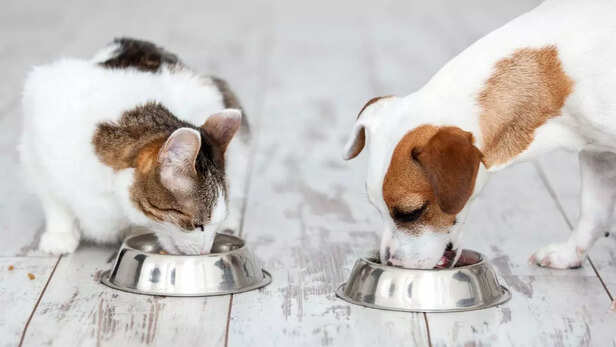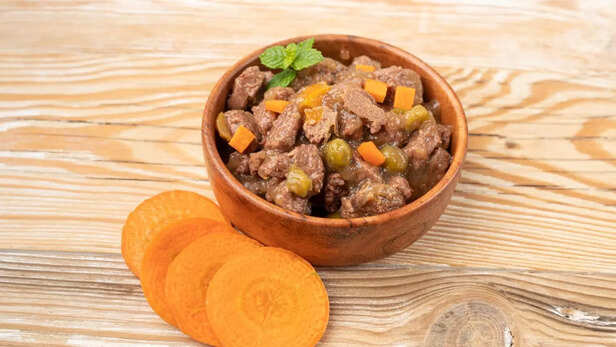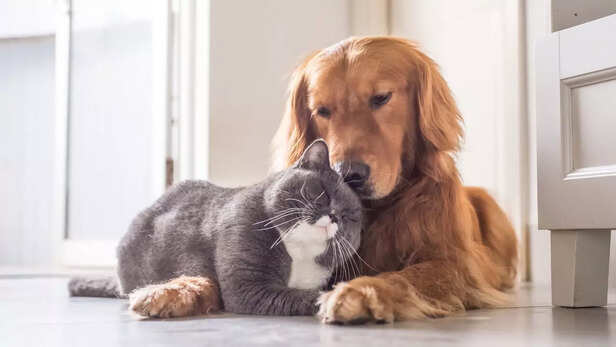Purr-fectly delicious: Foods both dogs and cats love
News Desk | Apr 04, 2025, 17:40 IST
( Image credit : Times Pets )
Discover the best food for both dogs and cats with our guide to common food pets love. From healthy treats dogs and cats can share to everyday dog and cat-friendly foods, we cover nutritious, safe, and tasty options your furry companions will enjoy. Make mealtime simple and satisfying for all your pets with these shared favorites.
Feeding pets a nutritious diet to ensure their overall well-being is essential. Like human beings, pets also have their dietary restrictions. While there is a certain way to feed your pet, the shocking truth is that they are often fed food scraps and leftover human meals. Before you feed your pet scraps, there are certain needs of your pet that you should follow regarding their diet.
Choosing high-quality and non-toxic food items for your pet will ensure the health of their digestive system and help them maintain their energy levels. The following article lists 10 safe food options for both cats and dogs, detailing their health benefits and nutritional components.
By understanding and making these conscious choices when it comes to your snuggly dogs and cuddly cats, owners can make better dietary decisions, ensuring their furry friends stay happy and healthy.

1. Eggs (cooked or scrambled without oil or butter)
Benefits: Eggs are high in protein, which supports muscle and tissue repair. They contain Vitamin B and essential components such as biotin, which are necessary for the formation of fatty acids and glucose.
Raw eggs should be avoided to protect your pets from harmful bacteria such as Salmonella. It can cause severe issues like high fever and systemic infections.
2. Cooked meat (chicken, fish)
Benefits: Rich in protein, essential for muscle growth and maintenance.
Cooked chicken contains iron and Vitamin B, known for boosting energy levels among cats and dogs. It also provides amino acids essential for both, such as leucine and lysine—key building blocks of protein.
Before giving meat to your furry friends, make sure it’s unseasoned and cooked without garlic, onions, or excessive oils, as these can be toxic to pets.
3. Fish (Salmon or Tuna – cooked or canned)
Benefits: Rich in omega-3 and fatty acids, which support skin, joint, and bone health. They also provide essential nutrients like B vitamins and potassium, which play a crucial role in nerve transmission and muscle function.
Avoid raw fish due to the risk of parasites, and ensure all food is free from salt or seasoning.
4. Carrots

Benefits: Carrots are low in calories and high in fiber, aiding digestion.
They are rich in beta-carotene and Vitamin A, which support eye health and maintain dental health.
Remember to cut carrots into small pieces; they can also be cooked for easier digestion.
5. Blueberries
Benefits: Blueberries are packed with antioxidants that protect pets from cell damage. They contain vitamins such as K and C, which strengthen the immune system. They are low in fat but high in fiber. In addition, blueberries also provide magnesium for both cats and dogs.
Remember to feed in moderation to avoid any digestive issues.
6. Green Beans
Benefits: Low in calories but high in nutrients. They contain vitamins A, C, and K, provide fiber, and aid in digestion and weight management.
Offer plain, cooked, or raw green beans without added salt or water.

7. Plain Oatmeal
Benefits: Plain or cooked oatmeal is a safe option for pets, offering fiber, vitamins, and minerals. It provides slow-releasing carbohydrates, keeping energy levels stable.
Ensure it is sugar-free, cooked, and without any flavorings.
8. Plain Yogurt
Benefits: Yogurt is a natural probiotic that supports gut health and digestion. It is high in calcium and protein, strengthening bones and muscles.
When giving yogurt to your cats and dogs, opt for plain, unsweetened varieties without artificial sweeteners like xylitol, which is harmful to pets.

9. Pumpkin
Benefits: High in fiber content, it can help relieve diarrhea and constipation. It also provides essential vitamins such as A and C.
Serve plain, cooked, or canned pumpkin (without any sugar or spices).
10. Apples (without seeds or core)
Benefits: A good source of fiber and Vitamin C, promoting digestive and immune health. Apples can act as a natural teeth cleanser for both dogs and cats when chewed.
Ensure you remove the seeds, which contain cyanide. Cut apples into manageable pieces to prevent choking hazards.
It is essential to introduce new foods gradually and monitor for any allergic reactions.
Before giving any food to your pets, always consult a veterinarian to ensure they suit your pet’s specific health needs.
Discover expert advice and the latest tips on pet care, training, health, and more. Stay updated with all things pets at Times Pets!
Choosing high-quality and non-toxic food items for your pet will ensure the health of their digestive system and help them maintain their energy levels. The following article lists 10 safe food options for both cats and dogs, detailing their health benefits and nutritional components.
By understanding and making these conscious choices when it comes to your snuggly dogs and cuddly cats, owners can make better dietary decisions, ensuring their furry friends stay happy and healthy.

Common food items loved by both dog and cats
( Image credit : Times Pets )
1. Eggs (cooked or scrambled without oil or butter)
Benefits: Eggs are high in protein, which supports muscle and tissue repair. They contain Vitamin B and essential components such as biotin, which are necessary for the formation of fatty acids and glucose.
Raw eggs should be avoided to protect your pets from harmful bacteria such as Salmonella. It can cause severe issues like high fever and systemic infections.
2. Cooked meat (chicken, fish)
Benefits: Rich in protein, essential for muscle growth and maintenance.
Cooked chicken contains iron and Vitamin B, known for boosting energy levels among cats and dogs. It also provides amino acids essential for both, such as leucine and lysine—key building blocks of protein.
Before giving meat to your furry friends, make sure it’s unseasoned and cooked without garlic, onions, or excessive oils, as these can be toxic to pets.
3. Fish (Salmon or Tuna – cooked or canned)
Benefits: Rich in omega-3 and fatty acids, which support skin, joint, and bone health. They also provide essential nutrients like B vitamins and potassium, which play a crucial role in nerve transmission and muscle function.
Avoid raw fish due to the risk of parasites, and ensure all food is free from salt or seasoning.
4. Carrots

Treats dogs and cats can share
( Image credit : Times Pets )
Benefits: Carrots are low in calories and high in fiber, aiding digestion.
They are rich in beta-carotene and Vitamin A, which support eye health and maintain dental health.
Remember to cut carrots into small pieces; they can also be cooked for easier digestion.
5. Blueberries
Benefits: Blueberries are packed with antioxidants that protect pets from cell damage. They contain vitamins such as K and C, which strengthen the immune system. They are low in fat but high in fiber. In addition, blueberries also provide magnesium for both cats and dogs.
Remember to feed in moderation to avoid any digestive issues.
6. Green Beans
Benefits: Low in calories but high in nutrients. They contain vitamins A, C, and K, provide fiber, and aid in digestion and weight management.
Offer plain, cooked, or raw green beans without added salt or water.

Foods both dogs and cats love
( Image credit : Times Pets )
7. Plain Oatmeal
Benefits: Plain or cooked oatmeal is a safe option for pets, offering fiber, vitamins, and minerals. It provides slow-releasing carbohydrates, keeping energy levels stable.
Ensure it is sugar-free, cooked, and without any flavorings.
8. Plain Yogurt
Benefits: Yogurt is a natural probiotic that supports gut health and digestion. It is high in calcium and protein, strengthening bones and muscles.
When giving yogurt to your cats and dogs, opt for plain, unsweetened varieties without artificial sweeteners like xylitol, which is harmful to pets.

Dog and cat-friendly foods
( Image credit : Times Pets )
9. Pumpkin
Benefits: High in fiber content, it can help relieve diarrhea and constipation. It also provides essential vitamins such as A and C.
Serve plain, cooked, or canned pumpkin (without any sugar or spices).
10. Apples (without seeds or core)
Benefits: A good source of fiber and Vitamin C, promoting digestive and immune health. Apples can act as a natural teeth cleanser for both dogs and cats when chewed.
Ensure you remove the seeds, which contain cyanide. Cut apples into manageable pieces to prevent choking hazards.
It is essential to introduce new foods gradually and monitor for any allergic reactions.
Before giving any food to your pets, always consult a veterinarian to ensure they suit your pet’s specific health needs.
- What food can both dogs and cats eat?While dogs and cats are different species, some food options can be explored for both pets. Items such as carrots, pumpkin, blueberries, cooked meat, and apples—when given in moderation—can support overall good health.
- Which food do cats love the most?Cats are carnivores. They generally enjoy consuming fish and chicken, and they also like wet foods. A little dairy can be given in moderation, though many cats are lactose intolerant.
- What food attracts cats?Cats have a highly developed sense of smell, so strong-smelling foods such as salmon, tuna, sardines, and lean deli meat often attract them. While not all cats enjoy vegetables, some may prefer options like carrots, pumpkin, or spinach.
- Do cats drink milk?Adult cats are typically lactose intolerant and should not be given milk, as it can upset their stomach and disrupt digestion. As they age, cats often lose the enzyme needed to break down milk, so it’s best to avoid giving it altogether.
Discover expert advice and the latest tips on pet care, training, health, and more. Stay updated with all things pets at Times Pets!
